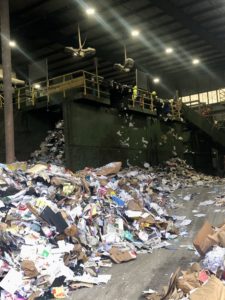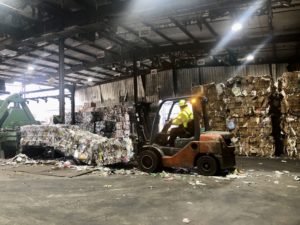
Nashville started a twice-monthly recycling program for residents this week.
This mass of recyclables, and often non-recyclables, goes to a Waste Management facility near Shelby Bottoms Park, on the southern side of the Cumberland River, to be sorted into four waste streams.
 Caroline Eggers WPLN News
Caroline Eggers WPLN NewsRecyclables are sorted at Waste Management’s recycling center in Nashville on Jan. 30, 2023.
The city currently accepts cardboard, paper and cartons, food and drink cans and plastic jars, jugs and bottles — no blueberry clamshells, bags or any other plastic.
Nashville only takes plastics #1 and #2, because those are the only plastics that are really recyclable. A recent Greenpeace report found that just 5% of plastic in the U.S. will ever get a second life.
Why isn’t more plastic recycled?
Plastics start with fossil fuels. Plastics are produced from natural gas and feedstocks derived from natural gas processing or crude oil refining, according to the U.S. Energy Information Administration, which does not estimate the actual amounts or origin of the materials used for plastics.
The petrochemical industry turns the hydrocarbons into various polymers. Most people are familiar with the “seven” types of plastic, but there are thousands of types of synthetic plastic materials.
 Courtesy Greenpeace
Courtesy Greenpeace There are thousands of types of “plastics,” or polymers of long chain molecules with hundreds to thousands of links in each chain.
Many environmental groups say that solving the plastic crisis requires a move away from plastic — and a shift in responsibility from the consumer to the companies that are producing the products.
That doesn’t mean that the other stuff isn’t getting recycled, however, according to Paul Farley, site manager for Waste Management’s recycling center.
 Caroline Eggers WPLN News
Caroline Eggers WPLN NewsPaul Farley, of Waste Management, holds up a type of plastic wrapper that is not recyclable.
“A lot of people think it just goes to a landfill,” Farley said. “We wouldn’t invest this kind of equipment and labor and everything else to just take something, separate it and put it in a landfill. All of this material has an end life beyond here.”
The vast majority of materials are shipped to a facility within a two-hour radius of Nashville.
Only about 13% of materials end up being sent to a landfill, Farley said, because people are including items in the stream that cannot be recycled.
 Caroline Eggers WPLN News
Caroline Eggers WPLN NewsA pellet of cardboard and paper can weigh 2,000 pounds, according to Waste Management.
Bags continue to be the largest problem. People are either including bags in their mix, or they are bagging up their recyclables.
There is also confusion about glass. Glass can be recycled in Nashville, but the material must be dumped at one of the city’s drop-off centers.
To learn more about Nashville’s program or to find the new recycling pick-up schedule, visit Metro Nashville’s recycling site.

